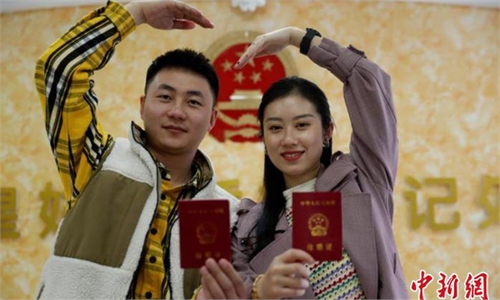Marriage registrations up 7.4% in 1st half, set to rise further on Chinese Valentine’s Day

Photo: VCG
As Qixi Festival, or traditional Chinese Valentine's Day approaches, Chinese cities are preparing for the upcoming peak day of marriage registration during the festival in order to offer good services for new couples despite the COVID-19 resurgence. Marriage registrations during the festival have been booked solid in many areas.
Last week, the latest data published by China's Ministry of Civil Affairs showed that marriage registrations in the first half of this year were 4.166 million, up by 287,000 year-on-year but down by 814,000 from the first half of 2019.
In the first half of this year, 966,000 divorces were registered nationwide, down 39.4 percent year-on-year, the data showed.
Also, six provinces have registered more than 200,000 marriages, and 19 provinces have registered more than 100,000. Central China's Henan Province ranked top in the number of the marriage registrations during the period with 340,000, followed by South China's Guangdong Province and Southwest China's Sichuan Province.
Observers predicted that marriage registrations would see a peak on Qixi Festival, which falls on Saturday.
Beijing Daily reported on Thursday that marriage registrations on Qixi have been booked solid in many districts of Beijing, such as Dongcheng and Haidian districts.
The capital's civil affairs bureau recently issued an announcement, requesting the departments for marriage registration and other civil affairs services to further strengthen anti-epidemic work. Appointments online and off-peak registration are encouraged, said the announcement, noting that gatherings should be avoided during the civil affairs service.
The city's departments for marriage registration on Saturday are open from 9 am to 1 pm and will only receive couples with appointments.
For epidemic prevention and control, the departments have created waiting areas separate from registration areas, and have set one-meter lines to ensure safe distances. Couples are requested to show green health codes and to have their temperature taken before entering.
Li Lie, director of the marriage registration department in Haidian district, was quoted by Beijing Daily as saying that door-to-door services and couples taking oaths for marriage at the registration office have been suspended due to anti-epidemic measures.
Marriage departments in other areas such as Suzhou in East China's Jiangsu Province launched similar measures to welcome Qixi while also ensuring safety. Some areas in Jiangsu have suffered amid the latest wave of COVID-19.
All of the 50 appointments for marriage registration on Qixi have been booked up, according to the department at Wuzhong district in Suzhou, local media reports said.
The marriage rate in general has seen a downward trend in recent years, Lu Jiehua, professor at the Institution of Sociology and Anthropology of Peking University, told the Global Times on Thursday. The smaller number of people of marriage age is a major cause for this, Lu said.
Not only are people born in the 1990s less in number than those born in the 1970s or 1980s, but variations in their living conditions have changed their view of marriage and family, Lu said. He noted that late marriage, cohabitation and even desire not to marry are becoming more common for various reasons, such as the financial pressure of housing and education.


